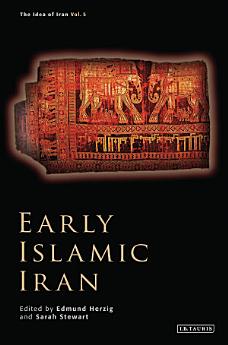Early Islamic Iran
Edmund Herzig · Sarah Stewart
Nov 2011 · Bloomsbury Publishing
E-Book
192
Seiten
reportBewertungen und Rezensionen werden nicht geprüft Weitere Informationen
Über dieses E-Book
How did Iran remain distinctively Iranian in the centuries which followed the Arab Conquest? How did it retain its cultural distinctiveness after the displacement of Zoroastrianism - state religion of the Persian empire - by Islam? This latest volume in "The Idea of Iran" series traces that critical moment in Iranian history which followed the transformation of ancient traditions during the country's conversion and initial Islamic period. Distinguished contributors (who include the late Oleg Grabar, Roy Mottahedeh, Alan Williams and Said Amir Arjomand) discuss, from a variety of literary, artistic, religious and cultural perspectives, the years around the end of the first millennium CE, when the political strength of the 'Abbasid Caliphate was on the wane, and when the eastern lands of the Islamic empire began to be take on a fresh 'Persianate' or 'Perso-Islamic' character. One of the paradoxes of this era is that the establishment throughout the eastern Islamic territories of new Turkish dynasties coincided with the genesis and spread, into Central and South Asia, of vibrant new Persian language and literatures.
Exploring the nature of this paradox, separate chapters engage with ideas of kingship, authority and identity and their fascinating expression through the written word, architecture and the visual arts.
Exploring the nature of this paradox, separate chapters engage with ideas of kingship, authority and identity and their fascinating expression through the written word, architecture and the visual arts.
Autoren-Profil
Edmund Herzig is Soudavar Professor of Persian Studies and a Fellow of Wadham College, University of Oxford. He is the author of The Armenians: A Handbook and Iran and the World in the Safavid Age (I.B.Tauris). Sarah Stewart is Lecturer in Zoroastrianism in the Department of the Study of Religions and Deputy Director of the London Middle East Institute at SOAS, University of London. She is co-editor, with Vesta Curtis, of Birth of the Persian Empire, Age of the Parthians, The Sasanian Era and The Rise of Islam, all published by I.B.Tauris.
Dieses E-Book bewerten
Deine Meinung ist gefragt!
Informationen zum Lesen
Smartphones und Tablets
Nachdem du die Google Play Bücher App für Android und iPad/iPhone installiert hast, wird diese automatisch mit deinem Konto synchronisiert, sodass du auch unterwegs online und offline lesen kannst.
Laptops und Computer
Im Webbrowser auf deinem Computer kannst du dir Hörbucher anhören, die du bei Google Play gekauft hast.
E-Reader und andere Geräte
Wenn du Bücher auf E-Ink-Geräten lesen möchtest, beispielsweise auf einem Kobo eReader, lade eine Datei herunter und übertrage sie auf dein Gerät. Eine ausführliche Anleitung zum Übertragen der Dateien auf unterstützte E-Reader findest du in der Hilfe.







